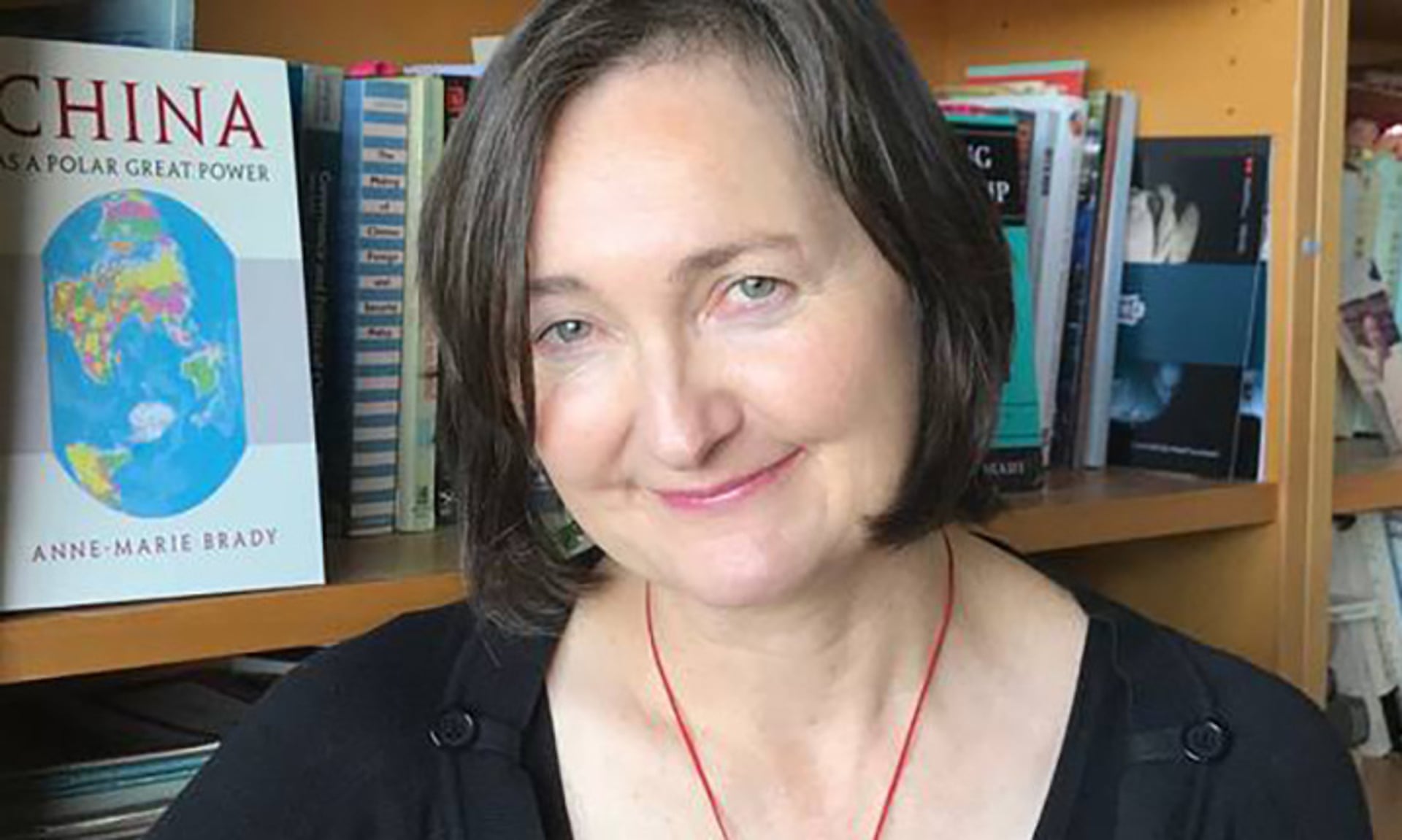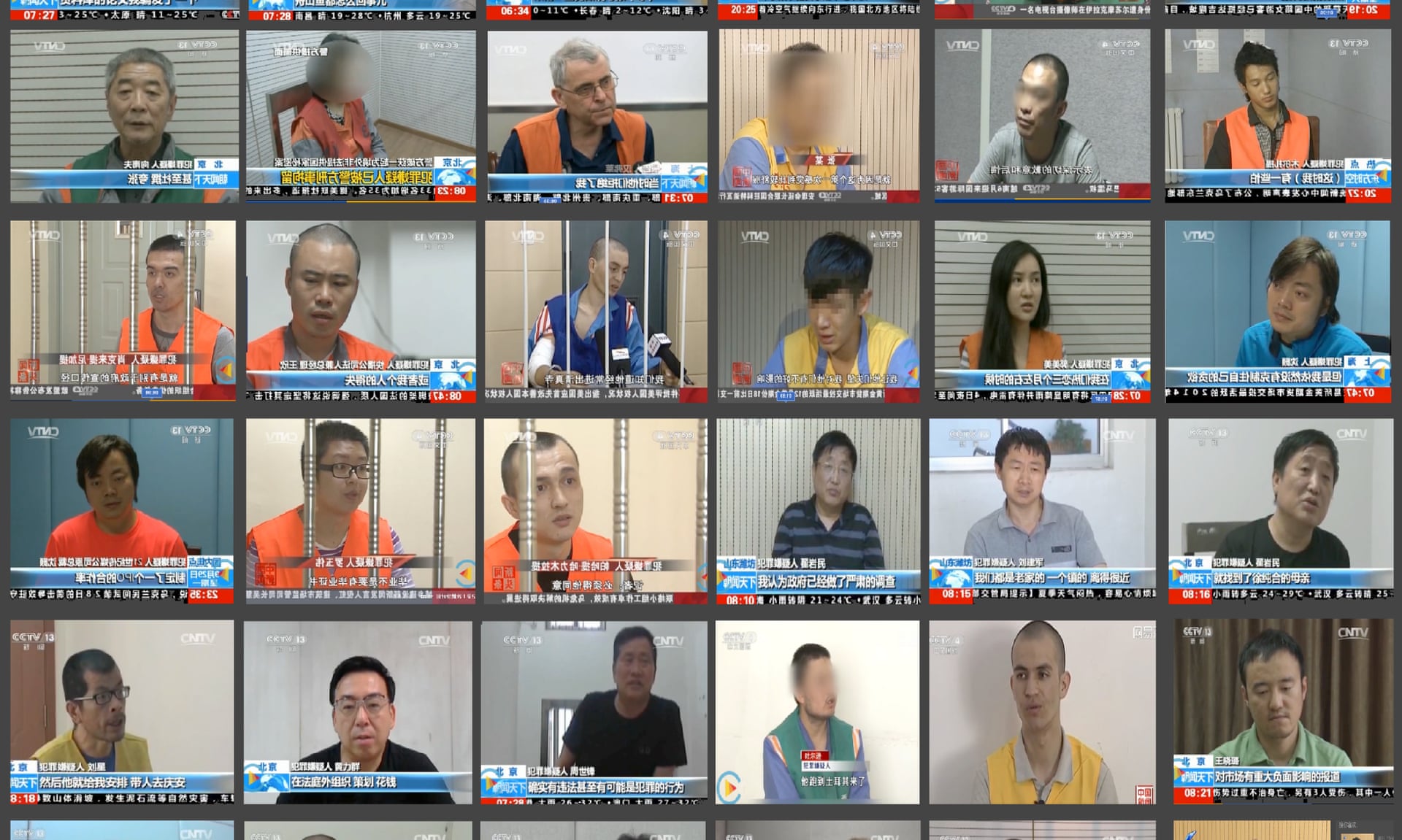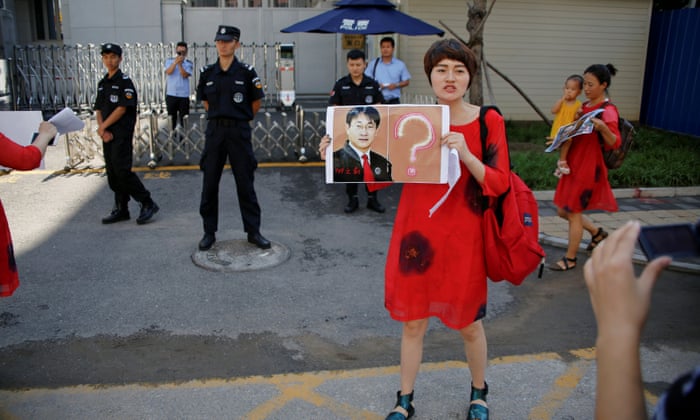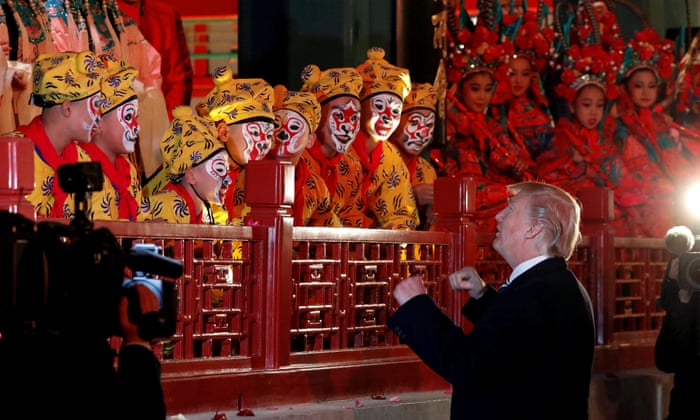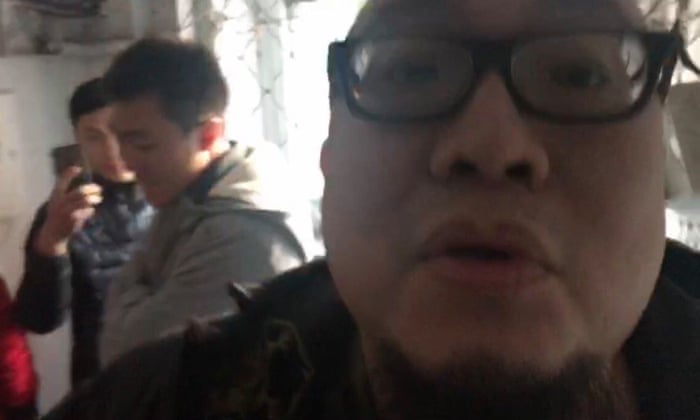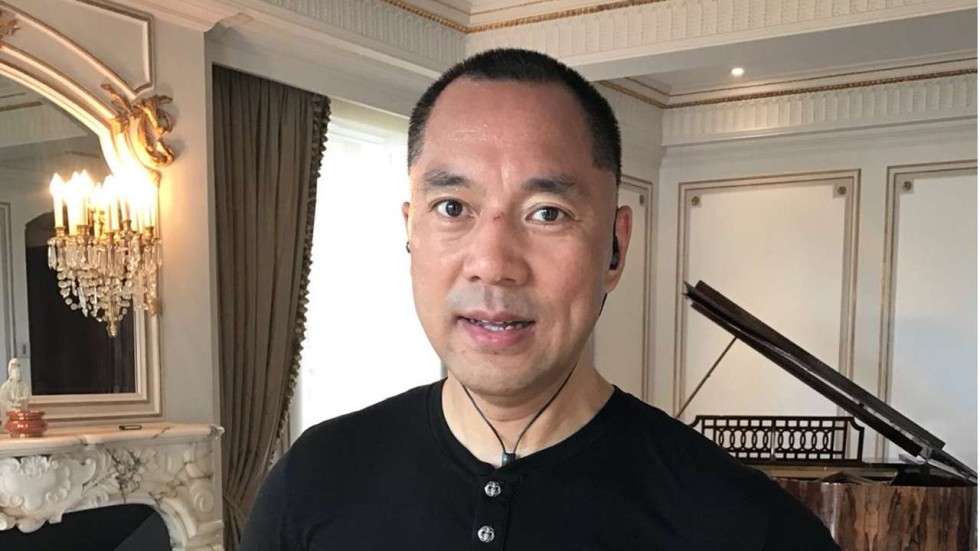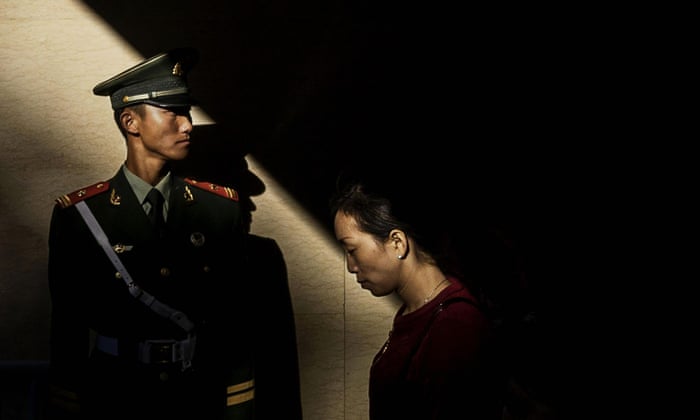
Wang Quanzhang, left, and his wife Li Wenzu, with their child in eastern China’s Shandong Province in 2015.
BEIJING — Nearly three and half years after Wang Quanzhang disappeared in China’s fierce offensive against human rights lawyers, he faced charges of subversion in a closed trial on Wednesday, capping a year when the Communist Party redoubled efforts to stifle political and religious dissent.
Mr. Wang, 42, was the last to be prosecuted among the hundreds of rights lawyers and activists rounded up in a sweep that started on July 9, 2015.
In a blaze of propaganda, the police accused him and other combative attorneys of disrupting trials, fanning discontent, and plotting to overthrow the Communist Party.
But while others detained in the crackdown were released with warnings, put on bail after making rehearsed confessions on television, or tried and sentenced, Mr. Wang remained held in secrecy.
But while others detained in the crackdown were released with warnings, put on bail after making rehearsed confessions on television, or tried and sentenced, Mr. Wang remained held in secrecy.
His trial was also swaddled in security to ward off protests.
“This whole process has been illegal, so how could I expect an open and fair trial?” Mr. Wang’s wife, Li Wenzu, said in a telephone interview before the hearing.
“This whole process has been illegal, so how could I expect an open and fair trial?” Mr. Wang’s wife, Li Wenzu, said in a telephone interview before the hearing.
“But my demand is still that he be freed as not guilty, because that’s what he is.”
The police and guards kept Ms. Li from leaving her apartment in Beijing to attend the trial in Tianjin, a port city about 65 miles southeast from her home in the capital.
The police and guards kept Ms. Li from leaving her apartment in Beijing to attend the trial in Tianjin, a port city about 65 miles southeast from her home in the capital.
During Mr. Wang’s detention, the authorities rejected repeated attempts by her and a succession of attorneys to visit him or find out more about his status and health.
The mobile phone of Liu Weiguo, the lawyer who represented Mr. Wang at the trial was turned off on Wednesday evening, and it was unclear when the trial ended.
The mobile phone of Liu Weiguo, the lawyer who represented Mr. Wang at the trial was turned off on Wednesday evening, and it was unclear when the trial ended.
But the Tianjin Second Intermediate People’s Court that heard the case said on its website that a verdict would be announced at a later date.
“Because state secrets were involved, the court decided under the law not to hold a public trial,” the statement said.

Li Wenzu shaved her head earlier this month to protest the detention of her husband, Wang Quanzhang, a human rights lawyer.
“This will be a show trial, carefully censored and tightly controlled,” said Terence Halliday, a research professor at the American Bar Foundation in Chicago who studies Chinese defense lawyers. “Through Wang Quanzhang’s protracted disappearance, China’s state security and public security have been sending a chilling message to activist lawyers — keep silent or this could be your fate too.”
Still, one detail slipped out from the secret proceedings that suggested Mr. Wang remained unbowed.
While in the courtroom, he dismissed his lawyer, Mr. Liu, who was not chosen by his family, Ms. Li said, citing a message from Mr. Liu.
That step may have forced an adjournment in the trial, but Ms. Li had no further details.
Mr. Wang’s case, though, has been overshadowed this year by other controversies in China as Xi Jinping, the party leader and president, has sought to extinguish potential threats to party rule.
Hundreds of thousands of Muslims in East Turkestan, a northwest region, have been detained in concentration camps where they are forced to renounce their religious beliefs and pledge loyalty to the party.
Mr. Wang’s case, though, has been overshadowed this year by other controversies in China as Xi Jinping, the party leader and president, has sought to extinguish potential threats to party rule.
Hundreds of thousands of Muslims in East Turkestan, a northwest region, have been detained in concentration camps where they are forced to renounce their religious beliefs and pledge loyalty to the party.
Several independent Protestant churches have been shut down, and an outspoken pastor of one was detained.
Two Canadians have been detained and accused of threatening national security in what supporters say was reprisal for a Chinese telecommunications executive’s arrest in Canada.
The detentions of lawyers and advocates in 2015 were a turning point on the way to more hard-line policies, said experts and friends of Mr. Wang.
The detentions of lawyers and advocates in 2015 were a turning point on the way to more hard-line policies, said experts and friends of Mr. Wang.
His prolonged detention came to symbolize the Communist Party’s growing readiness to override promised legal protections if they got in the way of silencing perceived threats, they said.
“The mass detention and surveillance campaign and other persecution in East Turkestan are the worst examples we know of at the moment, but they are connected to what is going on more widely in China,” said Eva Pils, a professor of law at King’s College London who studies China’s human rights lawyers and knows Mr. Wang.
“The mass detention and surveillance campaign and other persecution in East Turkestan are the worst examples we know of at the moment, but they are connected to what is going on more widely in China,” said Eva Pils, a professor of law at King’s College London who studies China’s human rights lawyers and knows Mr. Wang.
“Human rights defenders are very openly characterized as enemies of the people, connected to other, outside enemies.”

Peter Dahlin, who was detained and then deported from China, at home in Chiang Mai, Thailand, in 2016.
In the face of official pressure and rebuffs, Ms. Li and the families of other detained lawyers coalesced into a determined and creative resistance.
They have protested using red buckets, attempted walking to the detention center where Mr. Wang was held, and this month they shaved their heads to protest what they said was judges’ failure to enforce Mr. Wang’s rights under Chinese law. (The Mandarin Chinese word for hair (fa) sounds similar to the word for law.)
“In Chinese, having no hair sounds like having no law,” Ms. Li said.

Peter Dahlin, who was detained and then deported from China, at home in Chiang Mai, Thailand, in 2016.
In the face of official pressure and rebuffs, Ms. Li and the families of other detained lawyers coalesced into a determined and creative resistance.
They have protested using red buckets, attempted walking to the detention center where Mr. Wang was held, and this month they shaved their heads to protest what they said was judges’ failure to enforce Mr. Wang’s rights under Chinese law. (The Mandarin Chinese word for hair (fa) sounds similar to the word for law.)
“In Chinese, having no hair sounds like having no law,” Ms. Li said.
“We meant that we can do without our hair, but we can’t do without law.”
The prosecutors’ allegations against Mr. Wang appeared to distill several themes that the government has used to attack China’s human rights lawyers as a whole.
They accused him of “stirring up trouble” by calling together lawyers and supporters to demand that detainees be freed; of maligning China’s legal system online while representing members of a banned spiritual movement, Falun Gong; and colluding with a foreign-funded group to “propagate methods and tricks for resisting the government,” according to a 2017 prosecutors’ document shared by Peter Dahlin, a Swedish rights advocate named in the allegations.
Mr. Dahlin, who was detained in Beijing for 23 days in 2016 and deported from China for his work helping rights activists, said he was sure the document was authentic and rejected the claim that Mr. Wang’s activities amounted to “subversion of state power.”
The prosecutors’ allegations against Mr. Wang appeared to distill several themes that the government has used to attack China’s human rights lawyers as a whole.
They accused him of “stirring up trouble” by calling together lawyers and supporters to demand that detainees be freed; of maligning China’s legal system online while representing members of a banned spiritual movement, Falun Gong; and colluding with a foreign-funded group to “propagate methods and tricks for resisting the government,” according to a 2017 prosecutors’ document shared by Peter Dahlin, a Swedish rights advocate named in the allegations.
Mr. Dahlin, who was detained in Beijing for 23 days in 2016 and deported from China for his work helping rights activists, said he was sure the document was authentic and rejected the claim that Mr. Wang’s activities amounted to “subversion of state power.”

Police officers blocking the streets on Wednesday in front of the Number 2 Intermediate People’s Court in Tianjin, where Mr. Wang is being tried.
Mr. Wang was born in Shandong Province, east China, and was drawn to activism even before he had graduated from law school.
Mr. Wang was born in Shandong Province, east China, and was drawn to activism even before he had graduated from law school.
Like many other Chinese attorneys who take on contentious cases, his clients were mostly ordinary citizens in disputes with officials over land seizures, detentions and police abuses.
Even more than most rights lawyers, he has a stubborn streak, his wife and friends said.
His unbending personality “kept him going through years of abusive, incommunicado detention and given him the strength to refuse a forced confession,” Michael Caster, a human rights advocate who formerly worked in Beijing with Mr. Wang, said by email.
Even more than most rights lawyers, he has a stubborn streak, his wife and friends said.
His unbending personality “kept him going through years of abusive, incommunicado detention and given him the strength to refuse a forced confession,” Michael Caster, a human rights advocate who formerly worked in Beijing with Mr. Wang, said by email.
“He was never one to be intimidated by threats from judges or by the physical abuse of police.”
When asked about Mr. Wang and others detained in the 2015 crackdown, Chinese officials have said that they have been given all their legal rights.
When asked about Mr. Wang and others detained in the 2015 crackdown, Chinese officials have said that they have been given all their legal rights.
But legal experts have said that his long, secretive confinement and lack of access to his own lawyers flouted China’s laws.
In October, a United Nations Human Rights Council group condemned the secretive detention of Mr. Wang and two other Chinese advocates as a violation of international laws.
Chinese courts come under the guidance of the Communist Party and rarely, if ever, find defendants innocent in politically charged cases.
Chinese courts come under the guidance of the Communist Party and rarely, if ever, find defendants innocent in politically charged cases.
Some of his supporters said Mr. Wang could be given a suspended prison sentence like other some lawyers who were detained in 2015.
But others were less hopeful of early release.
“Even though Quanzhang is innocent, the outlook is bleak,” said Xie Yanyi, a recently disbarred Chinese rights attorney who tried to attend Mr. Wang’s trial.
“Even though Quanzhang is innocent, the outlook is bleak,” said Xie Yanyi, a recently disbarred Chinese rights attorney who tried to attend Mr. Wang’s trial.
“Wang Quanzhang’s wife and loved ones need to be mentally prepared.”
Mr. Xie said he was blocked by plain clothes officers from trying to reach the court in Tianjin and supporters who got near the courthouse were bundled away by the police, said reporters there.
Mr. Wang’s wife, Ms. Li, said that until he was detained she knew little about his work.
Mr. Xie said he was blocked by plain clothes officers from trying to reach the court in Tianjin and supporters who got near the courthouse were bundled away by the police, said reporters there.
Mr. Wang’s wife, Ms. Li, said that until he was detained she knew little about his work.
But she has since become a savvy advocate for her husband while trying to protect their 6-year old son.
In a public letter in July addressed to Mr. Wang, she said she told their son that his father had gone off to battle monsters.
“Let’s go help dad fight the monsters,” the son told a friend, Ms. Li wrote.
“Let’s go help dad fight the monsters,” the son told a friend, Ms. Li wrote.
“After they’re beaten, dad can come home.”






